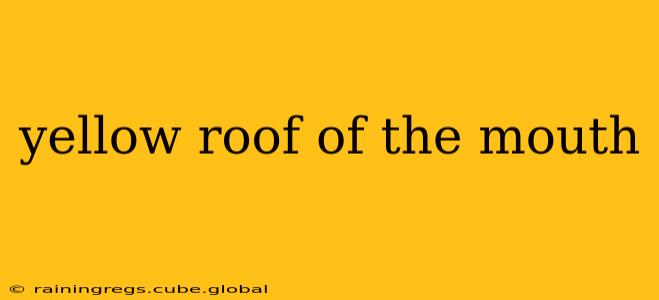A yellow roof of the mouth, also known as a yellow palate, can be a concerning symptom with several potential underlying causes. It's crucial to understand that this isn't a condition in itself, but rather a sign that something else might be amiss. This comprehensive guide explores the possible reasons for a yellow palate, associated symptoms, and when to seek professional medical advice.
What Causes a Yellow Roof of the Mouth?
Several factors can contribute to a yellow discoloration of the palate. Let's examine some of the most common culprits:
1. Dehydration
Severe dehydration can cause a yellowish tinge to the palate due to a build-up of waste products and decreased saliva production. The mouth becomes dry, and the tissues can appear slightly yellowed. This is usually accompanied by other dehydration symptoms like thirst, fatigue, and dark urine.
2. Smoking and Tobacco Use
Nicotine and other components in tobacco products can stain the tissues of the mouth, including the palate. Long-term smokers often experience a yellowing or brownish discoloration of the roof of their mouth. This is often accompanied by bad breath and a general increase in oral health problems.
3. Food and Drinks
Certain foods and beverages, particularly those with strong pigments like curry, turmeric, or certain berries, can temporarily stain the palate. This staining is usually superficial and fades over time with good oral hygiene.
4. Medications
Some medications can cause a yellow discoloration of the mouth as a side effect. It's essential to review your medication list with your doctor or pharmacist if you notice this symptom.
5. Jaundice
This is a more serious potential cause. Jaundice, characterized by yellowing of the skin and whites of the eyes, is a sign of liver dysfunction. A yellow palate can be a symptom of jaundice, indicating a need for immediate medical attention. Jaundice is often accompanied by dark urine, pale stools, and abdominal pain.
6. Oral Thrush (Candidiasis)
Oral thrush, a fungal infection caused by Candida albicans, can sometimes cause a yellowish or whitish coating on the roof of the mouth. This is usually accompanied by other symptoms like soreness, burning, and difficulty swallowing.
7. Hypercarotenemia
This condition occurs due to an excess of beta-carotene in the body, often from consuming large amounts of carrots or other orange-colored fruits and vegetables. It can cause a yellowing of the skin and the palate.
What are the Symptoms Associated with a Yellow Roof of the Mouth?
The symptoms accompanying a yellow palate depend heavily on the underlying cause. Some potential accompanying symptoms include:
- Dry mouth: Often associated with dehydration.
- Bad breath (halitosis): Commonly linked to smoking, poor oral hygiene, or infections.
- Soreness or burning sensation: Suggestive of oral thrush or other oral infections.
- Yellowing of the skin and eyes (jaundice): A serious symptom indicating liver problems.
- Fatigue and dark urine: Symptoms that often accompany jaundice and dehydration.
- Pale stools: Another sign of liver problems.
- Abdominal pain: Could indicate various underlying medical conditions.
When Should I See a Doctor About a Yellow Roof of the Mouth?
While a yellow palate from food or smoking is generally harmless, it's crucial to seek medical attention if the discoloration is accompanied by any of the following:
- Jaundice: Yellowing of the skin and eyes.
- Severe pain or discomfort.
- Difficulty swallowing.
- Persistent symptoms that don't improve.
- Fever.
How is a Yellow Roof of the Mouth Diagnosed?
Diagnosis begins with a thorough medical history and physical examination. Your doctor might ask about your lifestyle, diet, medications, and any other symptoms you’re experiencing. Further investigations may include blood tests to check liver function and identify other potential causes. In some cases, a scraping of the affected area may be taken to test for fungal infections.
What is the Treatment for a Yellow Roof of the Mouth?
Treatment depends entirely on the underlying cause. For example, dehydration is treated with increased fluid intake, while oral thrush might require antifungal medication. Jaundice necessitates prompt medical attention to address the underlying liver issue. Smoking cessation is crucial for smokers experiencing yellowing due to tobacco use. If the yellowing is caused by certain foods, simply avoiding those foods may be all that's needed.
This information is for educational purposes only and does not constitute medical advice. Always consult a healthcare professional for any health concerns or before making any decisions related to your health or treatment.
